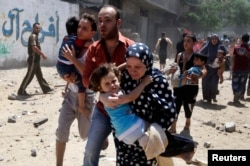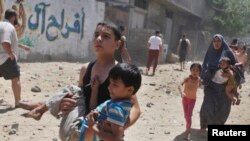Violence in the Middle East is escalating at a time when there are no new peace talks in sight.
Israeli and Palestinian leaders have condemned the murders of three Israeli teenagers and one Palestinian teen, and have vowed to punish those responsible.
But both sides also seem to be gearing up for more fighting. Israel has announced plans to deploy 40,000 reservists to its border with the Gaza Strip where Hamas leaders vow to fight Israeli occupation.
Prime Minister Benjamin Netanyahu says Israel will use air and ground forces to put an end to daily rocket attacks from the Gaza Strip.
"We will not tolerate rockets on our cities and villages, and therefore I ordered a significant enlargement of the Israel Defense Forces operation against Hamas terrorists, and against the terrorists of the other terror organizations in the Gaza Strip," he said. "I did this only after all efforts that were carried out to return to calm were not answered and Hamas chose an escalation."
Palestinians accuse Israel of continued aggression. A spokesman for Hamas, the hard-line group that controls the Gaza Strip, also expressed a determination to fight.
"We will continue to defend our people against these crimes," said Sami Abu Zuhri. "We warn the occupation not to continue its crime against our people and we assure that the resistance is ready to defend [against] this aggression."
Residents on both sides of the Israel-Gaza border fear the conflict could escalate into a full-scale war.
"Every time one side escalates, the other side does too," said Abdel Naser Sharab, a Gaza City resident. "This has affected people's lives, especially since it's Ramadan and people are fasting. Life has become paralyzed because people are afraid. Now that we are in a war atmosphere, people stay at home and listen to the news. It's a difficult situation."
The Israeli government has urged citizens living near the border with Gaza to stay close to bomb shelters. Residents of Re'im ran to shelters when they heard bombing.
"Tonight we had a very noisy night because the Palestinians sent so much rockets to the Israeli side and we had many problems with citizens who were scared," an Israeli emergency worker said. "They are out of shelters where we are living."
The United States has condemned the rocket attacks and called for de-escalation. But Washington has no influence in Gaza, especially after declaring Hamas a terrorist group.
"Of course, the United States has a strong relationship with Israel, but the lack of relationship and influence on the other side is extremely limiting," said Steve McInerney of Project on Middle East Democracy. "And I think the influence the United States could have to bring about a cease-fire is not very likely."
U.S. Secretary of State John Kerry has made reviving the Mideast peace process a top priority. He shuttled tirelessly between July of last year and April of this year to bring the sides together for talks.
While some progress was made, Israeli and Palestinian leaders hit a growing number of stumbing blocks that kept the two sides apart.
The current outbreak of violence, the worst in the area since 2012, erupted soon after the last round of peace talks was declared dead.














